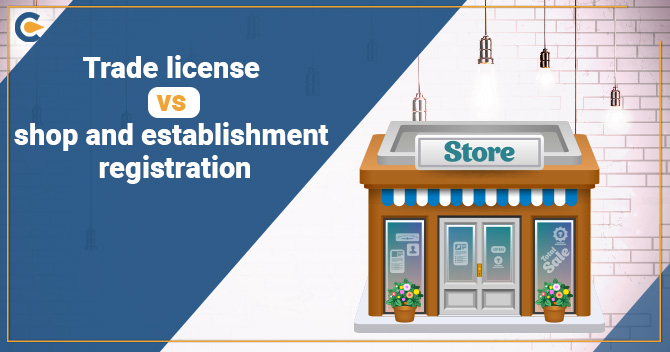A shop and establishment license is a vital requirement for business operators in India. This license, mandated by the Shops and Establishments Labour License Act, applies to businesses, professions, and trades registered under the Act. Registration under this Act is compulsory based on employee capacity. This Act’s primary objective is to protect employees’ rights and benefits, ensuring equal treatment within a business entity.
The Act encompasses the regulation of various aspects, including wages, working hours, and more, within a business entity. Separate bank accounts are required for all businesses to maintain transaction records, and the shop and establishment certificate simplifies this process. Additionally, this certificate serves as proof of commercial establishment when applying for other licenses.
Issued by the local municipal corporation or state labour department, a shop and establishment license grant legal permission for businesses or commercial establishments to operate within a specific jurisdiction. Its purpose is to enforce compliance with statutory obligations, maintain a safe working environment, safeguard employee rights, and contribute to regional economic growth. Acquiring this license establishes businesses as authorized entities to conduct operations in the designated area.
Eligibility to Obtain a Shop and Establishment License in India-
The eligibility to obtain a shop and establishment license in India extends to various businesses and establishments.
Here is an elaboration on the eligibility criteria for obtaining a shop and establishment license:
- Wholesalers or Retailers: The license is applicable to wholesalers and retailers operating physical stores or shops. It includes businesses involved in selling goods or products directly to consumers or other businesses.
- Service Centers: Service centres providing repair, maintenance, or servicing of products or equipment, such as electronic appliances, automobiles, computers, or mobile phones, are also eligible to obtain a shop and establishment license.
- Warehouses, Storerooms, and Go-Downs: Businesses or establishments engaged in warehousing, storage, or stock-holding activities are required to obtain the license. This includes warehouses, storerooms, go-downs, or similar facilities used for storing goods or inventory.
- Other Working Places: The shop and establishment license scope extend beyond traditional shops and includes various other working places. This may include offices, commercial establishments, consulting firms, professional services providers, educational institutes, clinics, salons, or any other premises where business activities are conducted.
- Hotels: Hotels, motels, lodges, or other establishments providing accommodation services are eligible for a shop and establishment license. This applies to both small-scale guesthouses and large-scale hotels.
- Eateries and Restaurants: Restaurants, cafes, food outlets, canteens, or any establishment involved in food preparation and serving, including takeaways, are required to obtain the license.
- Entertainment Houses, Amusement Parks, Theatres: Entertainment venues such as amusement parks, theatres, cinemas, clubs, gaming arcades, or any place providing entertainment services to the public fall under the purview of the shop and establishment license.
Procedures For Obtaining a Shop and Establishment License: Physical and Online Registration
Physical Registration Procedure
To obtain a shop and establishment license through the physical registration procedure, the following steps need to be followed:
- Application Submission: Within 30 days of commencing business activities, the commercial establishment or shop must submit an application for the license to the chief inspector of the respective area. The application is created using an authorized format, which may have minor differences depending on the state. Generally, the form will ask for essential details like the employee’s name, the establishment’s name and address, the number of employees, and the intended category of the establishment.
- Review and Inspection: Once the application is submitted, the inspector reviews the application and may conduct an inspection of the establishment premises to ensure compliance with relevant laws and regulations. This step is carried out to verify the provided information’s accuracy and assess the working conditions and safety measures in place.
- License Issuance: Once the review and inspection process are successfully completed, the establishment is granted the shop and establishment license. The license serves as proof of registration and authorization to operate legally. It is essential to display the license prominently on the premises for public visibility.
- Renewal: The shop and establishment license is typically valid for a specific period, after which it needs to be renewed. The renewal period varies depending on the state or union territory. Renewing the license within the prescribed time is crucial to ensure its continued validity.
- Closure Notification: In the event of closing down the business, the establishment or shop must notify the chief inspector in writing at least 15 days before the closure. This notification allows the authorities to update the register and cancel the registration certificate of the establishment or shop.
It is worth noting that the specific procedures and requirements may vary across states and union territories in India. Hence, it is recommended to consult the Shops and Establishments Act of the relevant state or seek guidance from the local municipal corporation or labour department to obtain accurate information about the specific registration procedure applicable in a particular jurisdiction.
Online Procedure for Obtaining a Shop and Establishment License
To obtain a shop and establishment license through the online procedure, the following steps need to be followed:
- Visit the Website: Start by visiting the official website of the Labor Department of the respective state where the establishment is located. Create a user ID and password on the website to proceed with the application process.
- Create Profile: Fill in the requisite details to create a profile for the establishment. This includes providing information such as the name of the proposed establishment/shop, details of the employer, details of employees, registered establishment address (along with NOC or rent agreement for rented premises), and PAN card details of the employer.
- Form A: Click on the website’s Shop and Establishment Registration Form A. This is the application form that needs to be filled out.
- Fill in the Requisite Details: Select the state and district where the shop or establishment is located and fill in the required details in the form. Provide accurate and complete information as requested.
- Upload Documents: Once the form is filled, upload the necessary documents per the requirements. These documents may include proof of address, identity proof of the employer, PAN card details, and any other documents specified by the website.
- Payment of Fees: Proceed to make the payment of the prescribed fees through the online payment portal provided on the website. The fee may differ based on the state or union territory.
- Checking the Status: After submitting the application and documents, the applicant can check the status of the application on the website. There is usually an option available to track the progress of the application, such as the under-scrutiny option.
- Issuance of the License: If all the submitted documents are in order and meet the Shop and establishment act requirements, the license certificate will be issued to the proposed establishment/shop.
Once the certificate is issued, it can be obtained by downloading it from the website
Nevertheless, it is vital to comprehend that the duration for the license issuance can differ depending on the state and the workload of the relevant authorities. While the online process is generally faster, it is recommended to refer to the respective state’s Shops and Establishments Act or consult the local labour department for precise details and any specific requirements applicable to the online procedure in a particular jurisdiction[1].
Key Regulations Under the Shop and Establishments Act
The Shop and Establishment Act in India encompasses various provisions that regulate critical aspects of shops and establishments. These regulations aim to ensure fair and safe working conditions for employees. The Act encompasses several essential areas, including but not limited to working hours, breaks for meals and rest, prohibition of child labour, regulations on women’s employment, weekly holidays, closure days, specified opening and closing hours, holiday pay, safety measures, payment terms, deductions from wages, policies on leaves, procedures for termination, and maintenance of employee records. These regulations play a crucial role in promoting work-life balance, preventing exploitation, ensuring employee safety, and maintaining fair employment practices.
Please be aware that the regulations and provisions pertaining to the Shop and Establishment Act may differ among various states in India. Hence, it is advisable to consult the respective state government portal or the official website of the labour department for comprehensive details and state-specific guidelines concerning the Act. Compliance with these regulations is essential for businesses to operate legally and provide a conducive working environment for their employees.
Benefits Of Obtaining a Shop and Establishment License
Obtaining a shop and establishment license offers several advantages and benefits for businesses.
The key benefits of acquiring the license:
- Compliance with Labor Laws and Regulations: The shop and establishment license ensure that businesses operate in accordance with labour laws and regulations. It helps safeguard employees’ rights and interests by ensuring fair working conditions, appropriate working hours, and adherence to minimum wage requirements. Compliance with labour laws helps businesses avoid legal penalties and maintain a positive reputation.
- Adherence to Safety Regulations: The license guarantees that businesses adhere to safety regulations and take necessary steps to establish a secure working environment for both employees and customers. This includes fire safety protocols, proper ventilation, and adequate lighting. By obtaining the license, businesses demonstrate their commitment to the well-being and safety of their workforce.
- Compliance with Statutory Requirements: The shop and establishment license ensure that businesses fulfil all the statutory requirements set by the government. This includes maintaining proper records of employees, adhering to payment regulations, and implementing necessary leave policies. By meeting these requirements, businesses avoid legal complications and create a transparent and accountable work environment.
- Credibility and Trust: The shop and establishment license enhances the credibility and trust of businesses among customers and stakeholders. It serves as proof that the business is legally registered and authorized to operate. Customers feel more confident engaging with licensed establishments, knowing that their rights as consumers will be protected. Additionally, stakeholders such as investors, partners, and suppliers are more likely to trust and collaborate with licensed businesses.
- Access to Government Benefits: The license may provide businesses with access to various government benefits and schemes. This could include eligibility for certain subsidies, grants, or financial assistance programs aimed at supporting registered businesses. By obtaining the license, businesses can take advantage of these opportunities to further their growth and development.
Overall, obtaining a shop and establishment license brings numerous benefits to businesses. It ensures compliance with labour laws, safety regulations, and other statutory requirements while also instilling credibility and trust in customers and stakeholders. It is a vital step in establishing a legitimate and responsible business entity.
Consequences Of Non-Compliance
- Credibility and Company Image: Statutory compliance is crucial for maintaining the credibility and reputation of a company. When a corporation is found to be non-compliant with regulations like Tax Deducted at Source (TDS), it jeopardizes the company’s image. Existing employees may question the company’s efficiency, and potential employees may hesitate to join. This highlights the importance of upholding compliance standards to foster trust and confidence in the company.
- Equality in Employee Treatment: Statutory compliance ensures that all employees are treated equally. Many laws and regulations specified in compliance checklists contribute to promoting equality in the workplace. This is particularly important when it comes to working hours and salaries, as compliance measures prevent discrepancies and favoritism. By providing a clear framework, statutory compliance prevents unfair practices and promotes a level playing field for employees.
- Defined Criteria for Tax Payments: Statutory compliance establishes defined criteria for tax payments. This not only simplifies the process for taxpayers, making it easier to pay taxes on time, but it also facilitates tax collectors in collecting owed taxes promptly. Compliance with tax regulations ensures that businesses fulfil their financial obligations to the government effectively and efficiently.
- Customer Loyalty: Non-compliance with statutory requirements can damage customer loyalty. Customers are hesitant to engage with firms that have weak compliance frameworks. Just as employees question the organization’s compliance structure, customers may perceive non-compliance as a sign of untrustworthiness or lack of professionalism. By maintaining statutory compliance, businesses can build and retain customer loyalty.
- Mitigating Financial Losses: Another crucial statutory compliance incentive is minimizing financial losses. Non-compliance penalties and fines can be levied on entities, resulting in significant financial consequences. These penalties and fines can disrupt cash flow, affecting the business’s overall financial health. By adhering to statutory requirements, businesses can avoid such financial setbacks and maintain stability.
- Ensuring Proper Working Conditions and Employee Rights: Shop Act license compliance plays a vital role in ensuring proper working conditions and protecting employee rights and privileges. Compliance with the provisions of the Act guarantees that businesses provide a safe and fair working environment. This contributes to the goodwill and reputation of the business, fostering employee satisfaction and productivity.
Conclusion
The necessity of obtaining a shop and establishment license is contingent upon the laws and regulations of the particular country, state, or local government in which the business is situated. In many jurisdictions, obtaining a shop and establishment license is mandatory for businesses operating within that jurisdiction.
Shop and establishment licenses typically regulate businesses’ working conditions, safety standards, and employment practices. They are intended to protect the rights and interests of employees and ensure that businesses comply with certain statutory obligations.
To determine whether a shop and establishment license is compulsory for the business, you should consult the local laws and regulations governing businesses in the specific location. This could include checking with the local municipality, city council, or relevant government departments responsible for business licensing. They will be able to provide accurate and up-to-date information regarding the requirements for operating a business and obtaining the necessary licenses in the area.
Read our Article:How To Apply For Modification Of FSSAI License?











